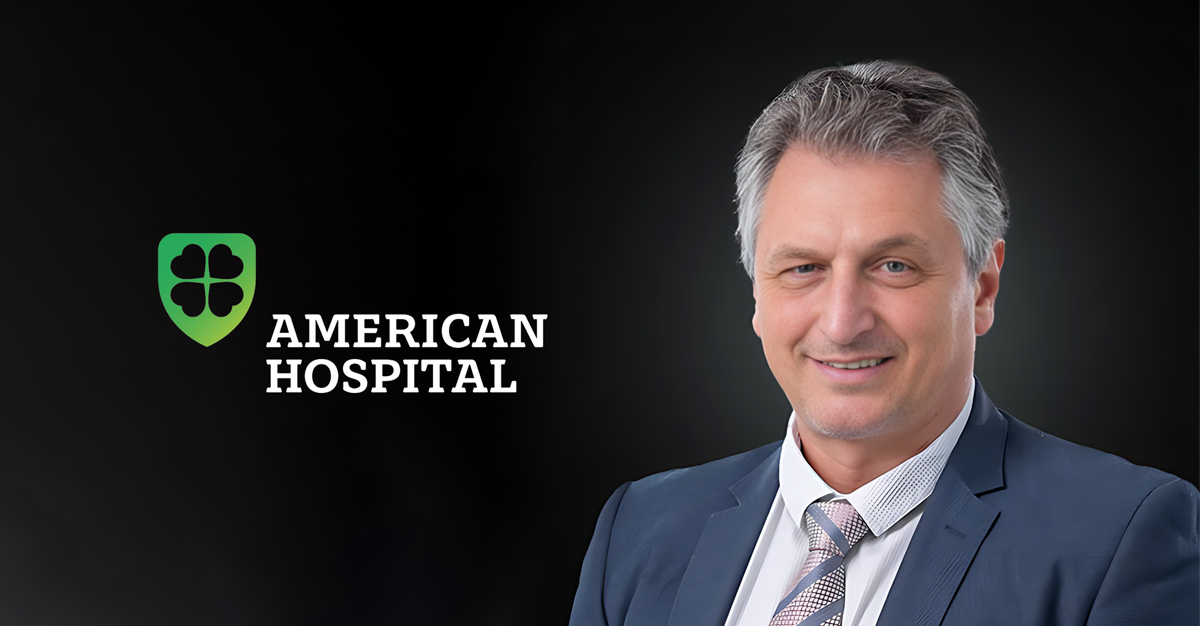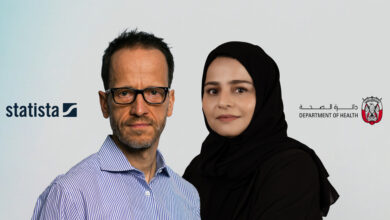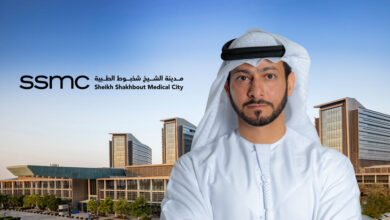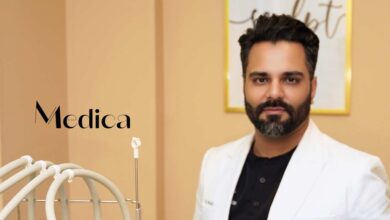Transforming Blood Cancer Care in the Middle East: An In-Depth

The fight against blood cancers has entered a new era, one defined by cellular therapies, and a global push toward earlier diagnosis and more effective cures. In the Middle East, where lymphoma and leukemia rank among the top five cancers¹, the potential for life-saving innovation is immense, especially given the region’s relatively young patient population.
At the forefront of this transformation is Dr. Emmanouil Nikolousis, a highly respected hematologist with extensive experience across the UK, Greece, Cyprus, and now the UAE. As a pioneer in bone marrow transplantation and cellular therapies, Dr. Nikolousis has seen firsthand how advanced treatments like CAR T-cell therapy can change the prognosis for patients once considered untreatable.
In this interview, Hospitals Magazine speaks with Dr. Nikolousis about his journey, the challenges and opportunities in regional cancer care, and the hope that cutting-edge therapies bring to patients across the Middle East.
Dr. Nikolousis, can you start by telling us about your journey and what first inspired you to specialize in hematology, bone marrow transplantation, and cellular therapies?
When I first chose hematology, it was still a relatively young and rapidly evolving specialty. That was part of the attraction, it combined research opportunities, laboratory diagnostics, and direct patient care in a way that few other fields did. Hematology was also one of the first specialties to adopt targeted treatments and small-molecule therapies, largely because we could analyze the molecular profile of diseases.
Over the past 20 years, these advances have transformed the entire treatment landscape. I was drawn to that potential to be in a field where ongoing research, clinical trials, and innovation could directly change patient outcomes.
You have practiced in the UK, Greece, Cyprus, and now the UAE. How has this international experience shaped your approach to patient care?
My years in the UK were incredibly formative. The training was comprehensive, not just in clinical skills but also in management, safety, and governance. I served as head of hematology, bone marrow transplantation, and cellular therapies, which gave me a deep understanding of both patient care and departmental leadership.
Greece was a different environment, and while the structure of care varied, I learned to take the best from each system. Now, in the UAE, particularly at American Hospital Dubai, I’m working in the most dynamic environment of my career. Our management has an ambitious vision: to deliver the best cancer care in the region and be recognized internationally. We already treat patients from across the Middle East, and we are beginning cellular therapies, including CAR T-cells, this month.
During your time as Clinical Director at University Hospitals Birmingham, your team won “Team of the Year” in 2019. What lessons did that experience teach you?
That award was a testament to the power of teamwork. Hematology is not a one-man show; you need people with different skills, all focused on the patient. It’s like football: if you have 11 Ronaldos, you won’t win. You need clear roles, diverse expertise, and a shared goal. That’s exactly the culture we are building here in Dubai.
How prevalent are blood cancers in the UAE and the wider Middle East?
Lymphomas and leukemias are among the top five cancers in the region¹. One important difference compared to Western countries is our younger patient population². This allows us to offer more intensive, potentially curative treatments. For younger patients, the goal is always a cure. In contrast, in the UK, the population is older and has more comorbidities³, which makes some advanced treatments more difficult to implement. In the Middle East, especially the UAE, therapies like CAR T-cells and advanced transplant options can have an even greater impact.
Are diagnoses increasing in the region?
Yes, and that’s concerning, not just because we are seeing more cases, but also because mortality rates are still high⁴. Access to newer drugs can be delayed. Getting them added to hospital formularies is not always straightforward, and in a region where much of healthcare is insurance-based, obtaining approval for advanced therapies can require multiple applications.
Another major gap is the absence of clinical trials⁵. In the UK, US, and Europe, patients often have access to experimental therapies through trials. Here, that access is still extremely limited.
For a patient newly diagnosed with blood cancer, what does the typical journey look like?
At American Hospital Dubai, we are fortunate to have a multidisciplinary team trained in the US, UK, Germany, Scandinavia, Italy, and Spain. Our culture prioritizes early diagnosis. Patients may present to different specialties depending on their symptoms, a neck lump to ENT, weight loss to gastroenterology, night sweats to internal medicine, or persistent fever to infectious diseases. It’s critical for all specialties to recognize potential blood cancer symptoms and refer patients early, because timely diagnosis can make the biggest difference in outcomes.
How do you decide on treatment options?
We use evidence-based medicine, relying heavily on Phase III clinical trials. The treatment landscape has evolved; traditional chemotherapy is still used, but targeted therapies and cellular treatments now offer new possibilities. It’s not just about prescribing the drug. The real challenge is managing potential side effects effectively. With targeted therapies, side effects are different from those of chemotherapy, but they require expertise to handle.
Could you give an example of how treatment may progress for certain patients?
For diffuse large B-cell lymphoma, most patients start with R-CHOP or pola-R-CHP, depending on the latest evidence. If they relapse early or are refractory, we now move directly to CAR T-cell therapy, which has proven superior to autologous stem cell transplantation, the previous standard of care⁶.
What makes CAR T-cell therapy so promising?
CAR T-cell therapy is one of the most powerful tools we have today. Before it, refractory patients had a poor prognosis or poor outcomes⁷. Now, in some clinical trials, we have seen long-term survival and more than 27% relative reduction in mortality compared to refractory patients receiving the previous standard of care⁸.
The process is fascinating: we harvest the patient’s immune cells, send them to an accredited manufacturing lab, and “train” them to recognize and attack cancer cells. After a short course of light chemotherapy, we reinfuse the modified cells. Once inside the body, they actively seek and destroy the cancer⁹.
What progress have you made with advanced therapies at American Hospital Dubai?
In less than a year since we began allogeneic stem cell transplants, we have completed 22 procedures from unrelated donors and haploidentical siblings. That’s a testament to our team’s passion and readiness to move to the next level with CAR T-cell therapy.
What about side effects and complications?
All advanced therapies have risks. The key is to have a multidisciplinary team trained to identify and manage side effects quickly.
Side effects do not mean the treatment won’t work; they are part of the journey, and managing them effectively is critical to achieving the best outcomes.
How do decision-makers in the region support these therapies?
Support varies. Some governments fully fund CAR T-cells, some premium insurance plans cover them, while others send patients abroad, sometimes for non-accredited products, which is risky. Only FDA- and EMA-approved CAR T-cell products have passed the rigorous trials proving safety and efficacy.
If you could make one call to action to decision-makers, what would it be?
Establish a unified national pathway for complex procedures like CAR T-cells and stem cell transplants regardless of insurance status. A national tumor board could allocate patients to the right centers quickly, preventing delays that can lead to relapse. I have seen cases where patients missed their treatment window because of prolonged insurance approval processes.
You mentioned the lack of clinical trials. How do you see that changing?
We have just established a clinical trials unit at American Hospital Dubai capable of conducting Phase III studies. We hope to partner with pharmaceutical companies and gain government support to bring trials here. The UAE is making great strides, and I believe we will soon be part of the global research network.
Looking ahead, what gives you hope for cancer treatment in the Middle East?
The willingness to adopt new treatments is strong here. The Middle East has the potential to become a healthcare hub, attracting patients from around the world. Twenty years ago, patients traveled to the UK or US; now, the vision is for those countries to send patients here.
What message would you like to give to patients and their families facing blood cancer?
A cancer diagnosis is devastating, but it is no longer a death sentence. We now have treatments with curative potential.
Patients should feel empowered to discuss their diagnosis openly, removing the stigma helps them understand their treatment pathway and improves their outcomes. We have many weapons against blood cancer, and a cure is possible.
On a personal level, what does it mean to you when patients achieve long-term remission?
It is the most rewarding part of my work to see patients return to their normal lives, celebrating milestones like “transplant birthdays.” For us, success is not only survival but quality of life. Whatever it takes, we will be there for our patients.
References
-
- Alessy SA, Alqahtani SA, Vignat J, Abuhmaidan A, Basmi AEL, Al Lawati N, Ali A-Nooh A, Shelpai W, Alhomoud S, Al-Zahrani A, Bray F, Znaor A. The current and future cancer burden in the Gulf Cooperation Council (GCC) countries. Cancer Med. 2024 Sep;13(17):e70141. doi: 10.1002/cam4.7014.PMID: 39279725; PMCID: PMC11403302.
https://pmc.ncbi.nlm.nih.gov/articles/PMC11403302/#:~:text=3.1.&text=There%20were%20an%20estimated%2019%2C895,%2C%20Tables%20S6%20and%20S7). - Al-Shamsi, H.O. and Musallam, K.M. (2024), Not only a Western world issue: Cancer incidence in younger individuals in the United Arab Emirates. CA Cancer J Clin, 74: 227-228. https://doi.org/10.3322/caac.21839
- Fowler H, Belot A, Ellis L, Maringe C, Luque-Fernandez MA, Njagi EN, Navani N, Sarfati D, Rachet B. Comorbidity prevalence among cancer patients: a population-based cohort study of four cancers. BMC Cancer. 2020 Jan 28;20(1):2. doi: 10.1186/s12885-019-6472-9. PMID: 31987032; PMCID: PMC6986047. https://pubmed.ncbi.nlm.nih.gov/31987032/
- Arafa MA, Rabah DM, Farhat KH. Rising cancer rates in the Arab World: now is the time for action. East Mediterr Health J. 2020 Jun 24;26(6):638-640. doi: 10.26719/emhj.20.073. PMID: 32621496. https://pubmed.ncbi.nlm.nih.gov/32621496/
- Al-Shamsi HO. Barriers and Facilitators to Conducting Oncology Clinical Trials in the UAE. Clin Pract. 2022 Nov 7;12(6):885-896. doi: 10.3390/clinpract12060093. PMID: 36412672; PMCID: PMC9680222. https://pmc.ncbi.nlm.nih.gov/articles/PMC9680222/
- Tian L, Li C, Sun J, Zhai Y, Wang J, Liu S, Jiang Y, Wu W, Xing D, Lv Y, Guo J, Xu H, Sun H, Li Y, Li L, Zhao Z. Efficacy of chimeric antigen receptor T cell therapy and autologous stem cell transplant in relapsed or refractory diffuse large B-cell lymphoma: A systematic review. Front Immunol. 2023 Jan 17;13:1041177. doi: 10.3389/fimmu.2022.1041177. PMID: 36733398; PMCID: PMC9886865. https://pmc.ncbi.nlm.nih.gov/articles/PMC9886865/
- Crump M, Neelapu SS, Farooq U, Van Den Neste E, Kuruvilla J, Westin J, Link BK, Hay A, Cerhan JR, Zhu L, Boussetta S, Feng L, Maurer MJ, Navale L, Wiezorek J, Go WY, Gisselbrecht C. Outcomes in refractory diffuse large B-cell lymphoma: results from the international SCHOLAR-1 study. Blood. 2017 Oct 19;130(16):1800-1808. doi: 10.1182/blood-2017-03-769620. Epub 2017 Aug 3. Erratum in: Blood. 2018 Feb 1;131(5):587-588. doi: 10.1182/blood-2017-11-817775. PMID: 28774879; PMCID: PMC5649550. https://pubmed.ncbi.nlm.nih.gov/28774879/
- Helwick, C. ZUMA-7: Primary Overall Survival Analysis Supports Axicabtagene Ciloleucel as Second-Line Therapy in Advanced Lymphoma. The ASCO Post. 2023 Jul 10. Accessed 1 Sept 2025. https://ascopost.com/issues/july-10-2023/primary-overall-survival-analysis-supports-axicabtagene-ciloleucel-as-second-line-therapy-in-advanced-lymphoma/
- CAR T Cells: Engineering Patients’ Immune Cells to Treat Their Cancers. National Cancer Institute. 2025 Feb 26. Accessed 1 Sept 2025. https://www.cancer.gov/about-cancer/treatment/research/car-t-cells
- Alessy SA, Alqahtani SA, Vignat J, Abuhmaidan A, Basmi AEL, Al Lawati N, Ali A-Nooh A, Shelpai W, Alhomoud S, Al-Zahrani A, Bray F, Znaor A. The current and future cancer burden in the Gulf Cooperation Council (GCC) countries. Cancer Med. 2024 Sep;13(17):e70141. doi: 10.1002/cam4.7014.PMID: 39279725; PMCID: PMC11403302.














